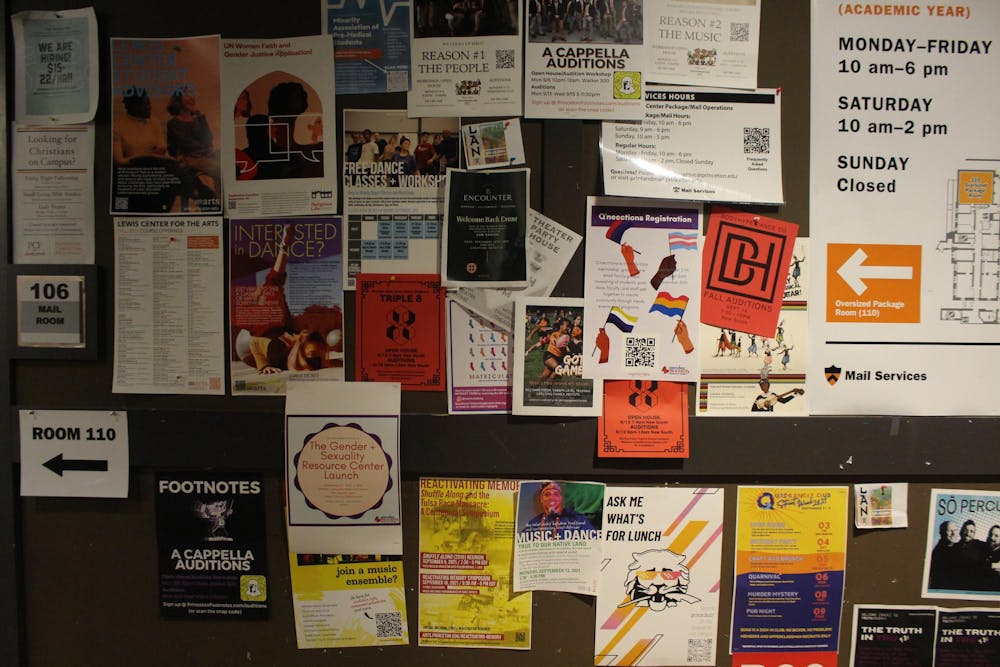Imagine this: You, a bright-eyed, bushy-tailed first-year, arrive on Princeton’s campus prepared to try new things, just like students at any other college across the country. But unlike most other colleges across the country, you aren’t actually able to try anything new, because the extracurricular activities you’re interested in only accept one applicant out of nearly 70. While the situation isn’t nearly that dire for most extracurriculars on this campus, many highly sought-after clubs are still worryingly selective.
Given that Princeton already screens students through the admissions process, this unnecessarily competitive club application process only serves to induce stress and encourage Princeton students to perpetuate falsehoods about themselves in order to get into clubs. Instead of manufacturing arbitrary prestige, Princeton clubs should nurture the interests of a wider array of students by hosting workshops and other programming directed at non-members, thereby making the extracurricular process more accessible to all.
This issue is particularly prevalent among Princeton’s most competitive finance clubs. In our experience, overly competitive application processes are ridden with disingenuous coffee chats and polite social events. Hundreds of students crowd around officers and make superficial small talk, shifting the focus of the process from genuine interest and curiosity to trying to make surface-level connections that can hopefully be used to gain access to these clubs, blurring the criteria for what exactly makes a good applicant. Simultaneously, this needlessly formal process pressures students to seem knowledgeable about or experienced in topics they may be trying for the first time, discouraging students from experimenting with activities and projects outside of their comfort zone.
Ironically, many finance clubs purport to be educational in nature: “creating a venue for students to share ideas and learn through hands-on investing,” in the words of one club, or giving members the opportunity to “learn the foundations of investing, pitch long-short equities, and connect with peers and alumni at the world’s top finance firms”, according to another. Or these hyper-competitive clubs hypocritically advertise that no experience is required, when such a fraught recruitment process suggests otherwise. For example, Tiger Consulting advertises throughout information sessions that they do not require experience in consulting, yet their application process culminates in breaking down a random consulting case and providing a recommendation.
A competitive application process detracts from their purpose: their focus shifting from educational and experiential value to the prestige students attain from being a member of these clubs. The latter can in itself still be valuable. But if clubs are all about prestige, they should not put on the facade of educating students, as the current application process shifts their inherent value towards exclusivity.
Finance clubs may be competitive because they do not have the resources to accommodate every applicant that applies. While this is understandable, there are still steps clubs can take to provide greater support and opportunities for inexperienced students. For example, the Princeton Model United Nations (MUN) team also has a fairly competitive application process involving multiple rounds of applications, but they provide opportunities for students who weren’t given a spot on the team to help organize and staff their annual conference for high school students. Through this process, students gain continued exposure to the club and, if they choose to apply again, get priority during the tryout process at the start of every semester. This approach makes gaining admission to the club tangible and realistic, shifting the focus from false performance to genuine growth.
A few finance clubs have started to implement more support and learning opportunities. Tiger Investments, one of Princeton’s investment clubs, holds open workshops throughout the year on topics ranging from accounting to financial investing and securities. While they don’t guarantee anything in terms of boosting admission chances for those who attend, these workshops allow students to learn about topics of their interest in a low-stakes environment.
If a greater number of competitive clubs on campus — in finance or another field — held open educational workshops and opportunities for students to explore their interests and develop their skills, perhaps students would not feel so stressed about gaining admission from one of them. Still, not enough clubs have caught on to this trend, or if they have, they haven’t advertised these opportunities well, making it near impossible to find ways to interact with these competitive clubs if you’re not a member.

These clubs might be attractive because students perceive them as giving a leg up in competitive industries like finance and consulting. But every year, hundreds of Princeton students still manage to enter these fields — 37 percent of the Class of 2024 who immediately entered the workforce went into business, for example. They cannot have all been a member of Tiger Capital Management or Tiger Consulting Group. More expansive programming and openness to non-members would help meet the demand for this broad-based campus interest and alleviate the pressure that students feel to perform for a spot in one of these clubs.
Princeton students have the drive, work ethic, and intelligence to be successful in any of their endeavors. Student clubs, therefore, should focus on cultivating and maximizing the potential of as many students to the greatest extent possible, rather than manufacturing prestige through an arbitrarily low admissions rate.
Noah Gezahegn ’29 is a contributing Opinion writer from Roxbury, N.J. He is a prospective Neuroscience major and can be reached at ng5372[at]princeton.edu.
Audrey Tan ’29 is a contributing Opinion writer from Pullman, Wash. She is a prospective Economics major and can be reached at at4887[at]princeton.edu.









